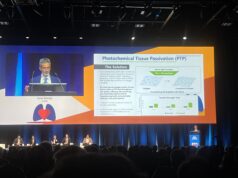
Intensive LDL cholesterol lowering with evolocumab does not reduce saphenous vein graft failure after coronary artery bypass graft (CABG) surgery compared to placebo, results of a randomised controlled trial have shown.
This is the headline finding of NEWTON-CABG CardioLink-5, an investigator-initiated randomised, placebo-controlled trial, involving more than 700 patients from sites in Canada, Australia, Hungary and USA.
Subodh Verma (St Michael’s Hospital, Toronto, Canada) presented primary findings of the trial at the 2025 European Society of Cardiology (ESC) congress (29 August–1 September, Madrid, Spain) alongside publication in The Lancet, reporting that the 24-month vein graft disease rate was not significantly different between the groups—21.7% with evolocumab and 19.7% with placebo.
Among the 782 randomised participants evolocumab achieved a mean 48.4% placebo-adjusted LDL-C reduction at 24 months (−52.4% vs. −4%). However, despite its efficacy in reducing LDL-C levels, there were no significant differences between the groups receiving evolocumab and placebo in the primary and key secondary efficacy endpoints of the trial, including the percentage of totally occluded grafts at 24 months (17% vs. 16%, respectively) and the proportion of patients with at least one totally occluded graft at 24 months (30% vs. 28%, respectively).
Verma and colleagues then sought to investigate any potential ethnicity-related differences in the finding by comparing the trial’s 122 South Asian and 384 white patients, reasoning that patients of South Asian descent are a high-risk population who make up a large proportion of atherosclerotic cardiovascular disease cases worldwide.
“We know that the accelerated and disproportionate rates of atherosclerosis seen in this population are often seen prematurely; there is a greater severity of the disease and there is amplified and unexplained risk that cannot be explained simply because of an accumulation of multiple cardiometabolic risk factors,” Verma said, presenting the results of the subanalysis at the European Association for Cardio-Thoracic Surgery (EACTS) annual meeting (8–11 October, Copenhagen, Denmark).
As the primary outcome of evolocumab versus placebo was not different in the overall trial, for the purposes of the ethnicity analysis, investigators combined both the placebo and the active treatment groups.
According to Verma, South Asian patients enrolled in the trial were on average younger (62 vs. 67 years), had a lower body mass index (BMI, 26.2 vs. 29kg/m2), a lower EuroScore (0.74 vs. 0.99), and a lower rate of smoking history compared to the white patients.
Results of the trial showed that the vein graft disease rate, defined as ≥50% stenosis or complete occlusion in the vein graft stood at 27% in South Asians patients, compared to 17.6% in white patients. Secondary outcomes, including the proportion of saphenous vein grafts that were 100% occluded (22.1% vs. 13.3%), and the participants with more than one saphenous vein graft 100% occluded (37.7% vs. 24.7%) were also higher in South Asians compared to white patients after adjustment for baseline characteristics, including age, sex, diabetes status.
The analysis showed no difference in the efficacy of evolocumab compared to placebo by ethnicity on vein graft disease rates.
“Translationally, these findings underscore the need for more dedicated studies to focus on ethnicity-based revascularisation strategies,” Verma told attendees of the EACTS meeting. “Such efforts are essential, I would suggest, to enhance our understanding of optimal revascularisation approaches and potentially develop targeted interventions, both pharmacological as well as surgical to mitigate this risk in a high-risk cohort that contributes to a large number of global patients undergoing bypass surgery.”









